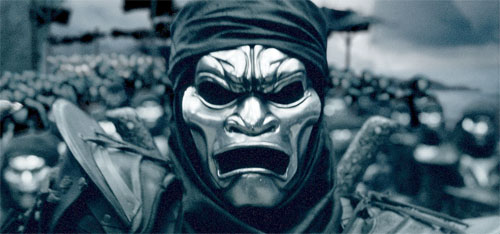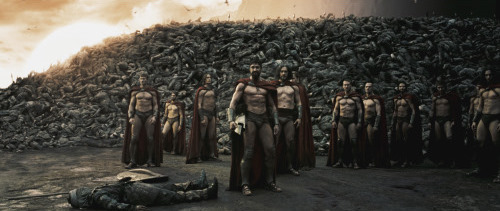It's midnight. Taking a break from listening to "Confederacy of Dunces" on my iPod (left over summer reading from the road-trip recently narrated,) I just watched the soul-sucking,mind-numbing, aesthetic-nullifying colossal fart of a film, “300.” I didn’t plan on making a movie review my next post, but risking a rant that would make Ignatius J. Reilly proud, I feel psychically damaged in a way that perhaps bears commenting upon.

Why did none of the reviews I ever read (many of which were quite positive) mention that this is the single most naked piece of war-mongering, Karl Roveian propaganda lately perpetrated by mass media? This heap makes Fox News look downright touchy feely, tinged by a brighter shade of pink.
Where to begin? I was prepared for the video game-like body counts, senseless violence, shallow dialogue, and legions of muscular man boobs/12 pack abs (begging the question, I know, why I was prepared for these things, and rented it anyway? Look, after a recent burst of Fellini, the pickings are getting slim on the Netflix…and I like HBO’s Rome. Call it my toga phase.) What I was not prepared for were the speeches, by all the white dudes, about freedom from the tyranny of all the dark dudes, cripples, Asians, mutants, politicians, and generally Those Who Believe Not as We Believe.
If you haven’t seen it or are otherwise unfamiliar with one of this year’s biggest blockbusters, a brief recap: in a steeply slanted retelling of the Battle of Thermopylae, Sparta, led by King Leonidas, is threatened with conquest by the evil “God King” Xerxes – who leads the multi-million strong Persian army (remember world history, kids – Persia is Iran.) Sparta is part of a confederation of free Grecian states, for which they act as prized mercenaries. They train their wee ones (the ones they don’t toss off cliffs for being weak, scrawny or undesirable in any way, as shown in scene one) from birth to be stoic, ruthless, fearless, immune to pain, and as reiterated repeatedly, “merciless.”
Xerxes is 9 feet tall, see, and bears a striking resemblance to a heavily facial-pierced Zinadine Zidane ,  the French soccer star, and even has an accent that’s kind of French and African mixed (like Zidane), thereby effectively demonizing two birds with one stone. His emissaries, who regularly show up with terms for Leonidas’ surrender, tend to be black Americans, and such caricatures of evil they even have evil facial hair, all the better to twirl between their greasy fingers while they cackle. Oh, wait — the last one is only Middle Eastern. Maybe even Persian. Leonidas has his hands tied by “inbred,” perverted, leprous mutant priests (with their nubile teen oracle love slaves) and the corrupt politicians who happen to control the congress in Sparta, opposing his noble will, and has to set out unsupported to defeat the Persians with a measly 300 top warriors. First though, he has some hot Cinemax-worthy sex with his Queen (one of the few compliments I can give the film is at least she wasn’t played by Pamela Anderson, or some similarly pneumatically-augmented babe, breaking at least one genre stereotype.) She is the only woman who comprehensibly speaks (others are all soldier moms/wives, whores, or servants, used for background effect) and when she does, it is merely as a mouthpiece in support of her Man/King. Good girl.
the French soccer star, and even has an accent that’s kind of French and African mixed (like Zidane), thereby effectively demonizing two birds with one stone. His emissaries, who regularly show up with terms for Leonidas’ surrender, tend to be black Americans, and such caricatures of evil they even have evil facial hair, all the better to twirl between their greasy fingers while they cackle. Oh, wait — the last one is only Middle Eastern. Maybe even Persian. Leonidas has his hands tied by “inbred,” perverted, leprous mutant priests (with their nubile teen oracle love slaves) and the corrupt politicians who happen to control the congress in Sparta, opposing his noble will, and has to set out unsupported to defeat the Persians with a measly 300 top warriors. First though, he has some hot Cinemax-worthy sex with his Queen (one of the few compliments I can give the film is at least she wasn’t played by Pamela Anderson, or some similarly pneumatically-augmented babe, breaking at least one genre stereotype.) She is the only woman who comprehensibly speaks (others are all soldier moms/wives, whores, or servants, used for background effect) and when she does, it is merely as a mouthpiece in support of her Man/King. Good girl.
After a bunch of his pussy regular army gets slaughtered, Xerxes sends out his “elite guard” (not to be confused with his “Republican Guard"…) called The Immortals, who wear ninja outfits and scary gold Kabuki masks, and also it turns out really suck at fighting Spartans, demonstrated as their torsos explode and their limbs fly. Later, desperate, head-scarved Persian “magicians” are sent in to toss some Improvised Explosive Devices/grenades, which cast lots of shrapnel around (I’m not making this stuff up, I swear.)

Inexplicably, when the Immortals’ masks come off,they look like the Orcs from ‘Lord of the Rings’, which I’m sure is purely coincidental.They have big scary deformed Troll dudes chained up ‘till things look bad, when they cut their chains, and the troll dudes go ape-shit on everybody but die anyway ‘cause they’re big and dumb…um, just like in LOTR. Ditto for the giant elephants with unwieldy war saddles (LOTR.) Then there are all the turbaned or African tribal baddies, all various shades of dark brown (if not simply deformed outright,) while our heroes are rippling bronzed man gods of British-Aryan hotness (just likein LO…hey! Wait a minute!) In one gratuitous scene, a sub-Saharan African general is decapitated by a furious Xerxes, and his head is shown in extreme close-up, twisting mid-air in slow motion for a full ten seconds, with a jack-o-lantern grimace. Later, a white Spartan hero's beheading is tastefully choreographed, from a distance. He is lamented by friends and family.
[Digressing a moment, it always bothered me that Tolkien’s books tended toward the xenophobic, and I was sad to see the movies stay so faithful to them in this respect, even embellishing visually with the heavily middle-eastern garb, and African tribal stock types who populated the ranks of the “earth degrading” hordes. I found it disturbing, as we invaded Irag again, and to my knowledge it’s gone without much common mention, though I can’t be the only one who noticed.]
This is fantasy’s confusing enigma: that despite its mythic pretensions, it is so often so culturally retrogressive, if not just plain stupid. Possibilities to reframe the inconsistencies and hypocrisies of mundane life with its exotic lens are only rarely met with much wisdom – Ursula Le Guin comes to mind as a successful example, as does Octavia Butler . That both these authors are women, feminists, ecologists, and that the latter is African American, is not incidental, I’d wager.
I kept thinking too about Jacques-Louis David (not known for his political objectivity,) and all those Neo-Classical masterpieces of agitprop allegory. Whole tableaus in ‘300’ go beyond homage to pictures like Oath of the Horatii, and even David's own depiction of this same battle, with slow-mo togas forever flowing in the breeze, erect swords and spears thrusting, jutting, and piercing every body in sight.

I haven’t read Frank Miller ’s original graphic novel upon which this film is based. Nor have I read ‘Sin City’ – the film version of which I loathed perhaps even more than ‘300.’ The students I teach at university,especially but not exclusively the male ones, are almost universally enamored of these movies. I was chilled to see scenes in ‘300’ that vividly evoked a disturbing dream I had some months ago, where I came upon legions of average-looking suburban 18-20-something youths chanting slogans of nihilism and death, in some giant fascistic nighttime parade. To one side, I spoke with a young woman who had been bound and was being held prisoner. She was just able to whisper that she had tried to speak out, and this was why she was captured, when she was taken away to an uncertain fate. It didn’t strike me at the time as a dream strictly about my own psyche, but rather as some picture of larger social forces symbolically distilled.
I thought of her again, this symbol of the heart’s natural, maybe call it feminine, desire to speak free from the threat of violence, as I watched, distressed, this unapologetic glorification of war, and relentless fetishized wallowing in its carnage. Straining credulity to breaking, “Rationality” and “Freedom” are the noble ideals held thinly forth by Leonidas in his occasional rousing speeches, given in a Connery-esque brogue that almost won me over, as if James Bond #1 was leading the charge — my own dude-ness was stirred.
These speeches happen briefly between balletic slaughters, just simplistic devices to propel us into the next bloodbath; freedom and rationality couldn’t be further from the heart of what is actually occurring on screen, or in one's own impressionable subconcious.They’re just empty phrases tossed about, with no other possible purpose than to eerily echo the jingo-jango-jingo of our rootin tootin cowboy prez. Make no mistake – there is no deeper wisdom meta-narrative, as might be interpreted from Herodotus' original story of the battle; or in Krishna's lending insight to Arjuna on the battlefield in the Bhagavad Gita; or the spacious Taoist philosophy of Sun Tzu’s Art of War; or Zen monk Takuan's schooling of samurai Miyamoto Musashi. Or even Yoda and Luke for that matter. This is blood because blood is our business, men, now drink up. “My heart now is full of hate,” one character confides. “Good,” smiles our fearless leader and hero, Leonidas.
In this way, the fantasy lens works just fine, but disturbingly, as in reverse, obscuring rather than clarifying our world, or the film's own intent. I guess movies like this are reassuringly free from questions, like “what is real freedom? Who is the real enemy? What is the essence of conflict, and its resolution?”, as they coldly stay “on message,” leaving no time for such weak, cowardly musings. Meanwhile,the body count rises and the carnage literally fills up the screen with hyper-aestheticized piles of bodies (and I have plenty of problems with the way the thing looks, but enough already.) The message apparently is still working to keep the proverbial troops pumped up, and in line – at least at the box office window. Ah heck, it’s just a movie, anyway. What’s the big whup?




3 comments
Although I would have to say that you opinion is well writen and devised I must agree and disagree on several points. I do find it ironic that the concept of a few holding down the “fort” a nice epic tale for a movie or – History. It weaves a tale of spent lives standing up for what they believe in. Like most art (and craft, I.E. Movies) context is everything. If we look back at works that seem mundane at the time like Abex Ex it would appear to be the musings of line and color. As most of us know, this is not true; it is a backlash to horrific WW II images. Perhaps if we now examine Jasper John’s Flags we find they mean something more, something different since 9-11. Maybe, we should only filter our views through the post-Bush worldview of corruption, distrust, fanatics, and war. If that is true then we should assume that the Star-Wars trilogy was an Orwellian response to Regan, and the new crappy Star Wars was directly a reference to the cabinet of W’s presidency. Although this is not the perfect metaphor maybe it illustrates the case. FYI- Frank Miller wrote and published 300 the graphic novel in the summer 1999. This of course is almost a year before W was voted in and took office. That one doesn’t add up even if you use Karl Rove’s math.
I have to agree with the abnormal amount of yelling in the film. Did King Leonidas have to really yell that much. Too many freaks for me too, but I like the elephants and Rhinos reference. As for the history- it got the basics down. A small batch of Special Forces held a land-advantage position against one of the largest land forces ever held. To me- that is pretty impressive. Sounds live some other GREAT moments in history that we have all studied. Greeks in Thermopylae, Led by Leonidas, stood and fell and took the pride of the Persian Empire down with them. Thermopylae is the prototype of many a last stand, from Roncesvalles to Isandlhwana to Bastogne – oh yeah and that little moment that most of us in this state call the Alamo, “Remember that one?” As for the Greeks and other historical accuracies and interesting tidbits, they were trained athletes; many had participated in the Olympic Games. In fact the battle raged while the Olympics were taking place and Greeks that participated in these Games were not allowed to leave and fight. This may be a reason why Leonidas received no reinforcements. That could explain the abs. They did have armor in real-life, but none in the movie. That bugged me a lot. I am sure I could pour over the interesting foundations of the movie, but it was a movie – like Indiana Jones, Jaws, and Tombstone. We watched it because it might be fun, and escape and visually stunning. The technical feats were astonishing. If ignore the gore, and look at the color saturations the cinematography and relies that the entire environment was based on a comic book. It blended someone’s stylistic approach with the camera’s realistic eye. It wove a story- one you didn’t like – from imaginary locations of times that have long passed. I do not envy the director of cinematography who had to look at the storyboards and say, “You want me to do that?”… Enough of my commenting and thank you for stirring the pot. Keep up the great work, and I don’t mean that factiously.
Basically your argument boils down to “hey its just entertainment; and it looks so cool!” Which is what everyone who likes the movie says (No one could argue in favor of its politics!) I just couldn’t disagree more – as stated at length above. You somehow imply that some “historical” event called the Battle of Thermopylae (of which we have only one subjective, mythologized document, written by the victors of that war), and a graphic novel written just before Bush took office, trump the reality of a movie that was made and released now, into this time and scene, with the licenses it takes (which are bold.) There were many ways to tell this tale – the way chosen here was deeply problematic, in all kinds of ways.
We let too much slide in the name of entertainment. We are too easily seduced by “cool shit.” I’m encouraging a little more criticality, for myself first an foremost.
I just watched a bootleg on-line … but I didn’t make it all the way to the final slaughter. I think you’re projecting. Initially I had a similar reaction – I interpreted it as a propaganda piece. Nevertheless, the Spartans are an outnumbered, irregular and volunteer force defending their homeland against invasion. Cultural identities within the film aside, an objective comparison to present strife suggest a greater possibility of identifying the Spartans as Iraqi insurgents.
But essentially – it’s just another trite Hollywood Frankenstein aimed at our baseist interpretations of courage and honor, for our visceral kicks and nothing more. Sadly, it’s our collective cultural need for metaphorical perspectives on the horror of the 21’st century that imposes these probing if misplaced interpretations.